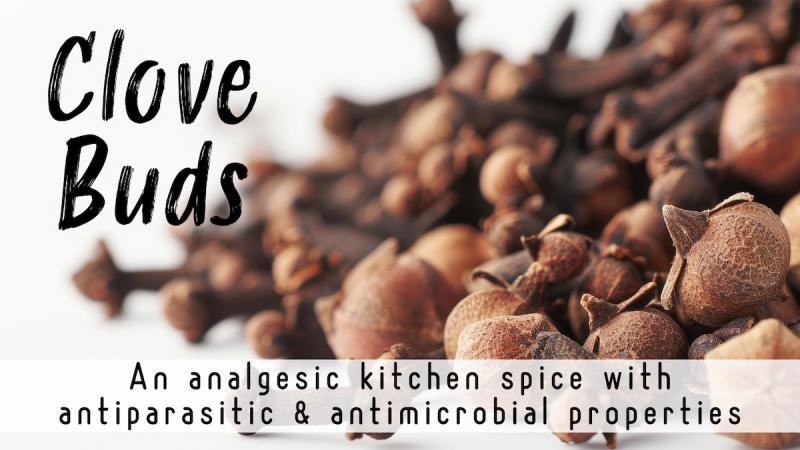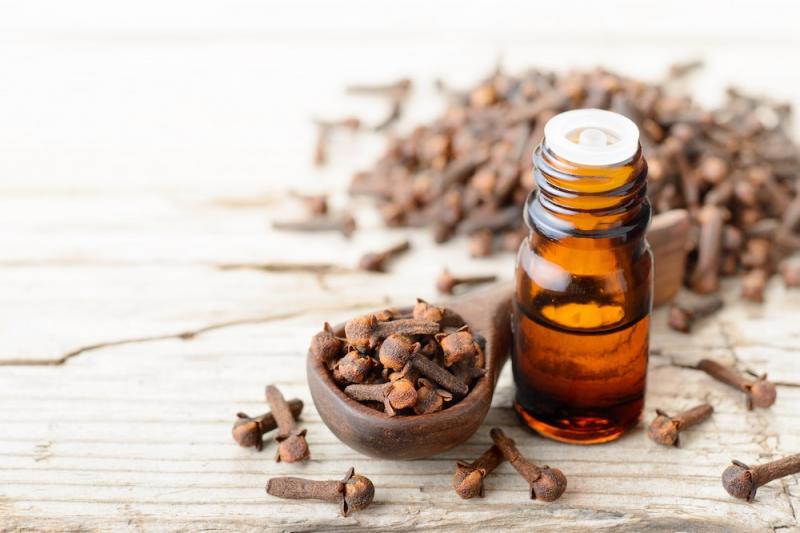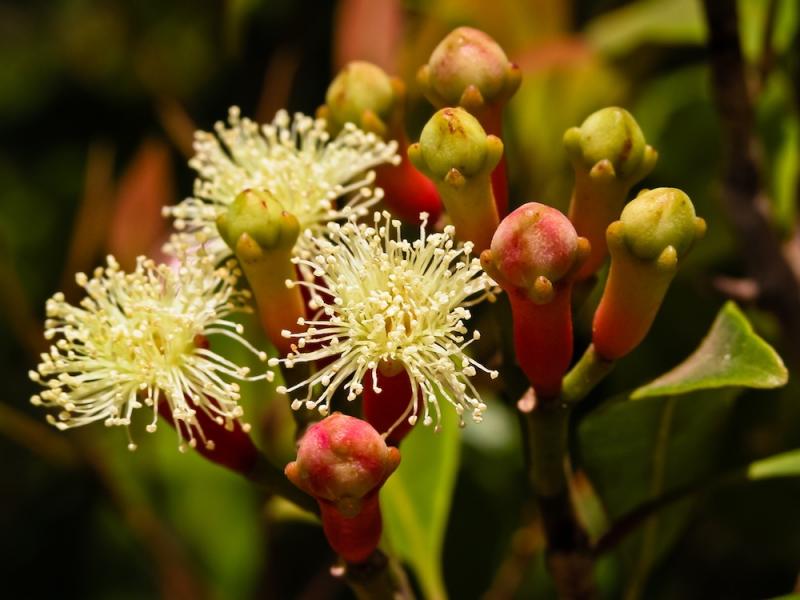
Cloves are the dried flower buds from an Asian tree. Best known as a kitchen spice, the herb is both pungent and warming and like other pungent herbs, it stimulates circulation and digestion. It’s also an antiseptic and analgesic remedy.
Hulda Clark also made it a popular antiparasitic remedy when she advocated a parasite cleanse using cloves, black walnut, and wormwood in her books A Cure for All Cancers and The Cure for All Diseases. While I disagree with her hypothesis that parasites are a root cause of most diseases, I think that intestinal dysbiosis can be a root cause of many diseases and that her parasite cleanse would also help to rid the digestive system of harmful bacteria and yeast and help to restore balance to the microbiome.
Clove has been used in Asia to treat diseases like malaria, cholera, and tuberculosis. In the West, it has been used for colic, abdominal bloating, indigestion, sour stomach, diarrhea, and bad breath. It can be specifically helpful for H. pylori and Candida infections. Clove was also an ingredient in Samuel Thomson’s Composition Powder which he used to clear out mucus and congestion or as he put it “scour the bowels and remove the canker.”
Clove Essential Oil
 I’ve had a lot more experience using clove essential oil, than I have had with clove as a whole herb. The oil contains eugenol and methyl salicylate and has analgesic, anti-inflammatory, and antispasmodic action. It also fights viral, bacterial, and fungal infections.
I’ve had a lot more experience using clove essential oil, than I have had with clove as a whole herb. The oil contains eugenol and methyl salicylate and has analgesic, anti-inflammatory, and antispasmodic action. It also fights viral, bacterial, and fungal infections.
One of the traditional uses of clove oil is to ease teething in children and toothache in adults. I've used clove for teething, but you need to dilute it well so it doesn't irritate the gums. Dilute it by placing one drop of clove oil into a teaspoon of olive oil. Then, put a small amount of this diluted oil on the gums.
As for toothache, I can personally attest to its effectiveness. I once developed a dental abscess that became excruciatingly painful in the middle of the night. While I’m usually pretty good at handling pain, this was really bothering me so much so that I did something I almost never do. I took an OTC pain killer, but it didn’t help. Fortunately, I had some clove oil around and I started applying it to the gums around the aching tooth. That worked and after about 15 or 20 minutes the pain had subsided and I was able to go back to sleep.
Other Uses for Clove Oil
 Because of its pain-relieving qualities, clove oil is often found in analgesic essential oil blends. It’s typically combined with other analgesic oils like wintergreen, eucalyptus, lavender, menthol, and camphor. Alone or in combination it can be massaged into sore muscles and joints to ease pain. It can also be applied topically to ease the pain of insect bites and stings.
Because of its pain-relieving qualities, clove oil is often found in analgesic essential oil blends. It’s typically combined with other analgesic oils like wintergreen, eucalyptus, lavender, menthol, and camphor. Alone or in combination it can be massaged into sore muscles and joints to ease pain. It can also be applied topically to ease the pain of insect bites and stings.
Clove oil can also be used to fight skin and mouth infections such as acne, canker sores, and gingivitis. It can also help ease bad breath when used in a mouthwash.
You can use the oil internally if you dilute it well. Put one drop of oil in a teaspoon of olive oil, coconut oil, or honey and take it internally with four ounces of water. This can be helpful for fighting SIBO, easing indigestion, boating, and abdominal pain, or dealing with intestinal infections or parasites. The oil can also be massaged into the abdomen for the same purposes.
Clove oil also acts as an emotional stimulant. Inhaling it helps clear the head and focus the mind.
Using Clove Bud
Clove buds can also be used to make a tea. Just steep two clove buds per cup. Sip the tea for indigestion, bloating, or nausea. The tea can also help fight colds and flu. Cloves can be taken in capsules for parasites or dysbiosis. Take 1 capsule two or three times a day. You can also find clove available as a tincture.
The oil may cause skin irritation so it’s a good idea to dilute it with some fixed oil for topical applications and observe the area for irritation. I also wouldn’t use the essential oil internally for more than two or three days.
Steven's Articles
January
-

-
Goldenthread, Phellodendron, and Yellow Root
Three herbal remedies containing the infection-fighting…
-

-
Teasel
A traditional herb for healing bones and joints…
-

-
Barberry and Healthy Personal Boundaries
A thorny shrub for fighting infections and supporting…
December
-

-
The Evidence for Berberine
A yellow alkaloid found in traditional infection-fighting…
-

-
The Sensible Use of Caffeinated Herbs
Kola nuts, guarana, and yerba mate and other herbs…
-

-
The Health Benefits and Problems with Coffee
This popular caffeinated beverage can be beneficial…
October
-

-
Understanding Caffeine & Cellular Adaptation
Preserving the power of caffeine's buzz and the…
September
-

-
Horseradish
A pungent spice for aiding protein metabolism…
-

-
Banaba or Crepe Myrtle
A beautiful tree from Southeast Asia whose leaves…
August
-

-
Monkeyflowers
Flower essences to help see ourselves more clearly…
-

-
Mariposa Lilies
Strengthening the bond between mother and child…
-

-
The Noble Bay Leaf
A common kitchen herb for aiding digestion and…
-

-
Epimedium: Horny Goat Weed
A circulatory stimulant and kidney yang tonic…
July
-

-
The Medicinal and Nutritional Benefits of Apricots
A nutritious fruit and valuable medicinal seed for coughs
-

-
Dogwoods
Asian dogwood is used to stop excessive discharge,…

